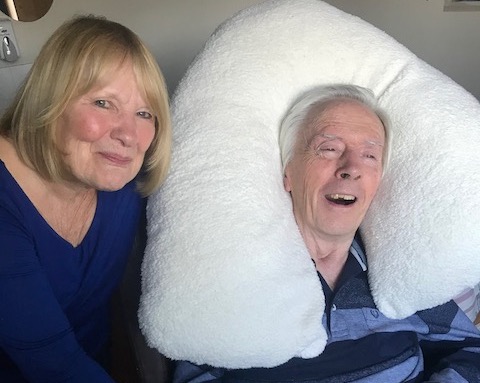“In sickness and in health, to love and to cherish till death do us part.” (Though not until the Local Authority has completed its Risk Assessment…)
Listening to the Radio 4 Today programme the Friday before last, July 31, I was struck by the quiet dignity of Carole Quirke, a wife who is unable to care for her husband Barry because he lives in a home. Carole is one of thousands of people who were “banned” from visiting their spouses. Married couples will have made unequivocal, lifelong commitments to one another. These will have been endorsed by a celebrant in the presence of witnesses and have legal as well as moral status. Currently these commitments are being disregarded in the panic to keep everyone out of care homes who is not paid. How can this be right?
Other partnerships may be equally profound and sincere and lifelong, without a marriage ceremony. The love of adult children for their parents is not formalised but is one of the deepest, most long-lasting human experiences. Family members or dearest friends who have known and loved each other through many stages of life, develop a special understanding which can be a unique source of strength when one of them is ill or frail. This is being ignored.
Carole’s husband has Lewy Body dementia. Although he used to be a keen sportsman he can no longer move. His vision, his hearing and his speech are impaired. Before the Covid-19 lockdown Carole spent hours every week with Barry; sitting close so he knew she was there, playing music to him, helping him eat and drink, massaging his legs so he ‘remembered’ how to use them, keeping him connected to his own identity within the deep bonds of their relationship.
Since lock-down Carole has been banished. She may look through Barry’s window by prior arrangement – though he cannot see her and can no longer hear the music she brings. A staff member undertakes his care though there is little time to spend on any individual now that all the other willing family carers have also been excluded.
Barry’s health is deteriorating. The average length of life after moving into residential care is two-and-a-half years; in nursing care it is 13 months. Many other wives, husbands, adult children and committed partners have already lost five months of that precious time since they were deemed “inessential” in March. There is now an understanding across social care that when death is imminent one key family member will be let in “to say goodbye”. When UK society began opening up since the strictest period of lockdown many family members began hoping for a phone call to tell them they would once again be welcome. This hope proved false. Many now dread the call as they know it’s more likely to be the announcement of the end.
Deaths from dementia have spiked unprecedentedly as bewildered residents, unable to understand why their closest family have abandoned them, have given up on living. That’s not a sentimental interpretation. Dementia is a terminal neuro-degenerative illness: if the loving support of the essential Other is withdrawn, the mind fails faster. Of the 440,000 people living in care homes over 70 per cent have dementia. Carole says: “I am very aware my husband is slowly dying, and I do not want him to be alone through this awful disease. I would like to add the home have agreed I can be with him when he is in the very final stage. But I would like him to feel loved and cared for now.”
Carole also spoke of the depression she is suffering now that she can no longer spend time with her husband: “When I am with Barry I find peace.” Love works both ways.
Recently the Secretary of State issued some long-awaited guidance for care homes and it was excitedly reported that families would now be “allowed” to visit. But yet again hopes were dashed; the government had merely passed responsibility to local authorities. The NHS welcomes Carole to visit her sister in hospital. Why could she not visit her husband? Because Wiltshire council had not yet given permission to the home to allow this. It needed to conduct risk assessments, formulate guidance. No date for this process was given.
This is happening all over the country. Yesterday a separated daughter, desperate to visit her mother in her care home, asked other members of a facebook dementia support group what access they had been allowed: 65 people had been allowed a garden visit, 26 had not been allowed any visit at all, 25 had been allowed to look at their loved ones through a window. Five people had been allowed to visit inside the care home and one person had been allowed to pick up their relative and take them out for a while.
Listening to Carole and reading the anguished messages of other spouses, adult children and committed partners prompted me to ask where this word “allowed” has come from? Who has assumed this right? In all the muddle and recrimination about care home test kits and inadequate PPE what seems to have passed un-noticed are the thousands of profound private commitments which are being treated as if they were trivial. Yet the lifelong promises people make to one another are central to their self-respect and spiritual survival. They are matters of conscience as well as expressions of deepest love. No government, local authority or care home manager should deny these essential connections; their clear duty is to use all means possible to facilitate them. In parable terms Mary’s presence mattered even more than Martha’s.
As the state appears to have forgotten this fundamental fact, it must surely be time for the UK’s spiritual leaders to speak out on behalf of the thousands of adults, like Carole, who simply want to do what is right and continue to give and receive love and comfort until they’re finally parted by death.
Julia Jones cared for her mother in a dementia home every day for 2 ½ years until her death aged 94. Julia is co-founder of John’s Campaign with Nicci Gerrard and is the author of Beloved Old Age – and what to do about it.
Twitter: @johncampaign



 Loading ...
Loading ...
What do you think?
You can post as a subscriber user ...
User comments (0)